WARR Hyperloop has done it again. The engineering students from the Technical University of Munich won SpaceX’s hyperloop pod competition on Sunday for the third time.
This year, WARR Hyperloop pulled off the win when their self-propelled pod reached a top speed of more than 290 miles per hour, a new record for the competition. The pod traveled 50% faster than WARR Hyperloop’s winning entry in the previous SpaceX Hyperloop Pod Competition held in August 2017. In the first competition, held in January 2017, WARR’s winning pod traveled just 58 mph. That’s progress.
The event was hosted, as it has since the beginning, by SpaceX and its founder Elon Musk at the company’s Hawthorne, California headquarters. The Boring Company, another Musk business pursuit, provided additional support this year.
The competition this year illustrates the evolution and advancements in hyperloop technology. For instance, in the previous two Hyperloop Pod competitions, student teams had the option of accelerating
their pod down the test track with support from a SpaceX-made vehicle called a “pusher.” This year, all pods had to be self-propelled. SpaceX also added another sub-competition focused on levitation technology. In this challenge the pods had to maintain alignment with the test track while hovering above it for an extended period of time.
WARR Hyperloop was one of three teams to make it to the finals—a 1.25-kilometer Hyperloop test track adjacent to SpaceX’s headquarters. Delft University from the Netherlands and EPFLoop of Switzerland also made it to the finals. The competition accepted 20 student teams from more than 40 countries to showcase their pods at SpaceX’s third Hyperloop Pod Competition.
Student teams had to demonstrate their pod’s ability to pass key tests and safety inspections. Each team’s pod also had to undergo testing inside a 26-foot long vacuum chamber and along a 150-foot long external test track built by SpaceX.
SpaceX isn’t working on or connected to any of the startups currently pursuing Hyperloop technology. But Musk is still involved in supporting the idea of a system of reduced-pressure tubes that would theoretically hurtle people and packages long distances at super speeds that he proposed in a nearly 60-page public white paper back in 2013.
